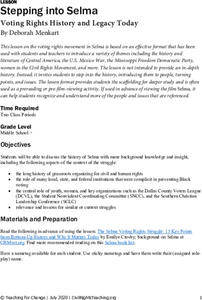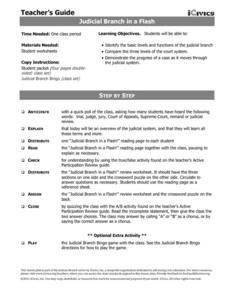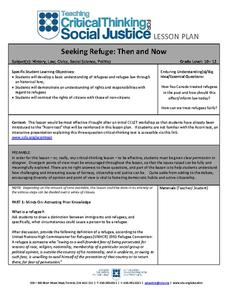Museum of Tolerance
Improving My Community Through Social Action
Action is the heart of change. Encourage class members to not only identify critical social justice issues in their school or community but to take action as well. As individuals or as groups, they research a situation, develop a...
Museum of Tolerance
And Justice for All? Slavery Not Just in the Past
Slavery in India, Sudan, and Mauritania? What about in the United States? Groups research modern slavery in these four countries, collecting factual evidence (What), determine their feelings about this evidence (So what), and consider...
Museum of Tolerance
Creating an Ideal World
To conclude a study of social justice and tolerance designed to prepare classes for a visit to the Museum of Tolerance, class members brainstorm a safe and peaceful world. They then write about their own vision of this world.
Just Health Action
Environmental Justice Matters: Mapping Environmental Justice Impacts (Part 1)
A case study of Seattle, Washington permits class members to compare and rank how different areas of Seattle are impacted by environment burdens. Groups investigate different zip codes, collect data on five categories, and color-code a...
Teaching for Change
Stepping into Selma
The 1964 Selma to Montgomery, Alabama voting rights marches are the focus of a lesson designed to introduce learners to people who took part in the Civil Rights Movement. Class members set into the role of one of the participants,...
Just Health Action
Environmental Justice Matters: Mapping Cumulative Impacts (Part 2)
A case study enables class members to confirm whether different geographic parts of Seattle, Washington have disproportionate environmental burdens and benefits. Groups use the EPA's Cumulative Health Impact Analysis formula and...
Just Health Action
Causes of the Causes: What Are the Root Causes of This Problem?
A "Causes of the Causes" diagram enables class members to examine the contributing factors to a problem. After reading a poem that models the process, class members, either in gorps or individually, diagram an issues they are passionate...
Just Health Action
Whose Backyard? Toxic Waste Management Meeting and Environmental Injustice
Toxic waste is a global problem. What to do with environmental hazards and where to put toxic waste is a global concern. To better understand current issues around toxic waste management and how current practices can lead to...
Ohio Center For Law-Related Education
Four Activities: Thurgood Marshall and the Nomination and Confirmation of Federal Judges
The process of nominating and confirming federal judges can sound like a lot of bureaucratic hoops, but a resource breaks down the steps of the Supreme Court nominations in a simpler manner. Learners participate in four activities that...
Learning to Live
Attributes of a Civil Society
What makes a society civil? High school freshmen search for examples of justice, kindness, peace, and tolerance in news media and brainstorm how they can promote these attributes in their schools, communities, and world. The well-rounded...
Museum of Tolerance
The Price of Personal Responsibility
A reading of Patrick Henry's "Speech in the Virginia Convention," Henry David Thoreau's "Civil Disobedience," and Rev. Martin Luther King, Jr.'s "Letter from Birmingham Jail" launch a discussion about the price one is willing to pay to...
US House of Representatives
A Picture is Worth a Thousand Words
Groups select a photograph from one of the four eras of African Americans in Congress and develop a five-minute presentation that provides background information about the image as well as its historical significance. The class compares...
iCivics
James Bond in a Honda? Trial Simulation
Your class members will take on the roles of jury members in this exciting simulation. After reading a detailed script and reviewing pieces of evidence, they will determine whether Honda violated copyright and copied James Bond.
iCivics
Judicial Branch in a Flash
What is the difference between the federal court and state court systems? What about criminal versus civil cases? Check out this resource that will offer your class members a general and effective overview of the judicial branch in the...
Utah State Courts
Judges in the Classroom
Class members explore the process of a disposition hearing for juveniles, particularly looking at how the judge decides what sentence the juvenile offender should receive. Task your pupils with evaluating different sample cases provided...
Curated OER
Espionage and Sedition Acts: Mock Trial
Bring to life the severity of the Espionage and Sedition Acts through a mock trial. Learners have prior knowledge of WWI and the context of these acts. An anticipatory set gets the class discussing the ethics of wartime dissension, and...
iCivics
The “Supreme” in Supreme Court
Does a public school have the right to restrict what t-shirts learners wear? Discover what happened when this question was brought to the Supreme Court, and review other major cases in United States history involving judicial review....
Foreign Policy Research Institute
Democracy Wall
How free are people in the United States, or in the world for that matter? The class reads and compares two articles that discuss levels of freedom enjoyed by different people around the globe. They discuss why some people have more...
Curated OER
Compare and Contrast Night to Life is Beautiful
After reading Elie Wiesel's Night, watching the movie Life is Beautiful, and researching World War II, class members write a comparison essay on the book and film. This includes a prior knowledge activity, discussion in whole and small...
State Bar of Texas
Baker v. Carr
Can the federal government override the state government to protect the citizens of the United States? The 1962 Supreme Court case Baker v. Carr outlines the issue of equal protection under the law. Scholars investigate with a short...
James Madison Memorial Fellowship Foundation
Those "Other Rights:" The Constitution and Slavery
Did the United States Constitution uphold the institution of slavery, or did it help to destroy it? Young historians study Article 4, Section 2, Clause 3 of the Constitution and evaluate the rights of slaveowners as they compared to or...
Canadian Civil Liberties Education Trust
Seeking Refuge: Then and Now
Participants examine refugee law and policies and read several case studies to prepare for a discussion of this hot-button issue. The packet includes a wide range of materials representing a variety perspectives.
Stanford University
Martin Luther King, Jr. and Malcolm X: A Common Solution?
Much has been made of the differences between Martin Luther King, Jr. and Malcolm X. But was there any common ground between them? Class members reconsider what they think they know about these two civil rights leaders with biographical...
Curated OER
Tech: Medical Forensics
High schoolers explore what it takes to be a forensic scientist or pathologist. They view a PowerPoint, discuss what education and skills are needed to succeed as a pathologist. They play a game to test their observation skills, a skill...

























